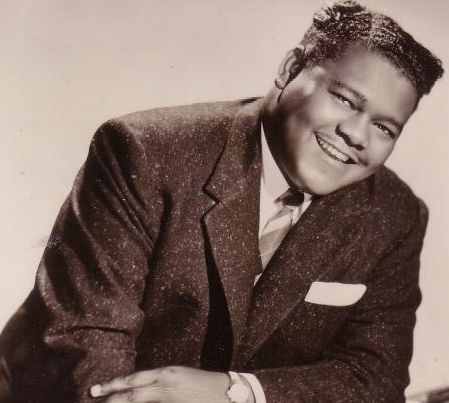The Songwriters Hall of Fame was saddened to learn of the passing of 1998 SHOF Inductee Antoine “Fats” Domino.
Born in New Orleans on February 26, 1928, Antoine ("Fats") Domino Jr., was one of eight children in the Domino clan. Fats followed the musical lead of his father who was a violinist, and an uncle who was a horn player. At a very young age, he showed an interest in an old upright piano that a cousin had left with the family for safe-keeping, and soon he was playing it well enough to become a young keyboardist in local honky-tonks. He was almost entirely self-taught, picking up ideas from boogie-woogie masters like Meade Lux Lewis, Pinetop Smith and Amos Milburn. “Back then I used to play everybody’s records; everybody’s records who made records,” he told the New Orleans music magazine Offbeat in 2004. “I used to hear ’em, listen at ’em five, six, seven, eight times and I could play it just like the record because I had a good ear for catchin’ notes and different things.”
He dropped out of school in the fourth grade to work as an iceman’s helper, but continued playing piano whenever he had the chance. He was a regular at The Hideaway, a local music spot, with a band led by the bassist Billy Diamond, who nicknamed him Fats. Mr. Domino soon became the band’s frontman and a local draw. In 1949, songwriter Dave Bartholomew saw him play and brought recording man Lew Chudd to The Hideaway where he immediately signed Fats to his label, Imperial Records.
Soon, the Domino-Bartholomew songwriting partnership was born and would prove to be one of the most successful in those early years of the Rock N’ Roll era. Together they created a sound with new musical accents and memorable rock and roll hit songs. Their first collaboration was "The Fat Man" in 1949, followed by several other distinctive and memorable collaborations including: "Ain't That a Shame," "All by Myself," "Bo Weevil," "Going to the River," "I'm Walkin”," "I'm in Love Again," "My Girl Josephine," "Walking to New Orleans" and "Whole Lotta Loving." "The Fat Man" was recorded in a post war blues style known then as "jump blues." Typical jump bands featured a strong rhythm section of piano, bass and drums with a singer or saxophonist, and sometimes both up front.
Mr. Domino’s trademark triplets, picked up from “It’s Midnight,” a 1949 record by the boogie-woogie pianist and singer Little Willie Littlefield, appeared on his rhythm-and-blues hit, “Every Night About This Time.” The technique spread like wildfire, becoming a virtual requirement for rock ’n’ roll ballads. Sitting in with Mr. Bartholomew’s band in 1952, he came up with the memorable piano part for “Lawdy Miss Clawdy,” one of the first rhythm-and-blues records to cross over into the pop charts.
There were many rhythm and blues hits, but in 1955, the white market also began to catch on to the phenomenon that was Fats Domino. The first major crossover recording was "Ain't That a Shame," which later also opened the doors to a movie career, with appearances in The Girl Can't Help It and Jamboree. The movie successes sparked a virtually unending series of one-nighters, including engagements with other rock and roll heroes like Danny and the Juniors and Jerry Lee Lewis at the vaunted New York Paramount Theater in Times Square.
During this later period in his career, Fats Domino continued songwriting, this time on his own, without benefit of collaborator. Among the most important songs he wrote during this period were "I Want to Walk You Home," "Please Don't Leave Me," "Three Nights a Week," "Be My Guest" and "Goin' Home."
“I was lucky enough to write songs that carry a good beat and tell a real story that people could feel was their story, too — something that old people or the kids could both enjoy,” Mr. Domino told The Los Angeles Times in 1985.
Fats Domino passed away at the age of 89 in October, 2017.


